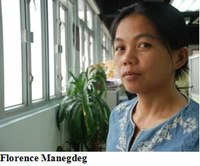(Note: this article was first published in the April 20, 2014 issue of the Sunday Examiner)
 In November 2005, Jose Manegdeg, a staff member of a church-based non-governmental organisation, was killed soon after he finished conducting a para-legal training in San Esteban, Ilocos Sur. Four years later, another 57 people, 32 of whom were journalists, were murdered in what is now known as the Maguindanao massacre. One of them was Alejandro Reblando, a journalist from General Santos City.
In November 2005, Jose Manegdeg, a staff member of a church-based non-governmental organisation, was killed soon after he finished conducting a para-legal training in San Esteban, Ilocos Sur. Four years later, another 57 people, 32 of whom were journalists, were murdered in what is now known as the Maguindanao massacre. One of them was Alejandro Reblando, a journalist from General Santos City.
 Jose (Pepe) and Alejandro (Bong) are among the hundreds of human rights and political activists, journalists, witnesses or anyone who dared to challenge the local political structure, and were killed for their courage. Most people knew them by their names, but many years later hardly anybody would have much interest in other details, such as what happen to their wives, children and their family?
Jose (Pepe) and Alejandro (Bong) are among the hundreds of human rights and political activists, journalists, witnesses or anyone who dared to challenge the local political structure, and were killed for their courage. Most people knew them by their names, but many years later hardly anybody would have much interest in other details, such as what happen to their wives, children and their family?
While others may have lost interest, the widows and their orphans, like the loved ones of Jose and Alejandro, continue to endure the pain and suffering on their own. Like us, the families of the Manegdegs and the Reblandos, share one community, one country. We share one community, but in their pain and loss, they are on their own.
Jose’s widow, Florence; and Alejandro’s widow, Myrna; are among the countless widows who have lost their loved ones due to senseless violence. The murderers did not only kill their victims, but their acts of violence also ended opportunities for their wives and children to feel the warmth of their love. In the profound feeling of loss, pain and longing, it is the living, not the dead that suffer the most. And no one who has not been through that can possible imagine what they are going through.
To me, the lives that Florence and Myrna continue to live, after the deaths of Jose and Alejandro says more about the kind of society we now have. Florence did not only lose Jose, but the Filipino society too lost a dedicated person educating people to protect their rights. Myrna did not only lose Alejandro, but we too lost a journalist who kept us informed.
While their husbands contributed to our society, their widows and children and those who care for them, had to come to terms on their own because neither the government nor our society were there to care and protect them.
In fact, as she prosecutes the soldier who killed her husband, Florence and her two children had to move from one place to another due to continuing threats in the absence of a State protection mechanism. Also, Myrna had to leave the Philippines to seek protection from another territory, Hong Kong, while prosecuting those involved in the Maguindanao massacre.
Their husbands, Jose and Alejandro, may have either been prepared or have chosen the lives they lived; however, their wives and their children had no choice.
In the case of Myrna and her children, the trauma that they suffered is deep, and beyond what anyone could imagine. Hardly anyone could understand. They are misunderstood. What they need is not only the presence of Alejandro, but the warmth of his love. It is difficult to imagine anything or anyone taking the place of the one they have lost.
In fact, the loss that Florence and Myrna have experienced is what more and more widows and children are experiencing.
Since January this year, about 19 human rights and political activist have been killed, one of whom was Romeo Capalla, the younger brother of Bishop Fernando Capalla of Davao. He was killed on March 15, in Oton, Iloilo.
In our country today, stories of targeted extrajudicial killings and disappearances, like what has happened to Jose and Alejandro, have become so common that they hardly provoke anger, let alone any interest. Our anger, even if there is, say after the Maguindanao massacre, was short lived. Four years on, even the media hardly covers stories about it.
What is happening clearly shows as to how fast the absence of protection and security is degenerating, not only for the social activists and their families, but for anyone in our country. We may ignore who these victims and their families are, but we cannot ignore that anybody can become a victim.
In our society today, indifference and apathy is deeply profound. I am still looking for answers as to why that is.